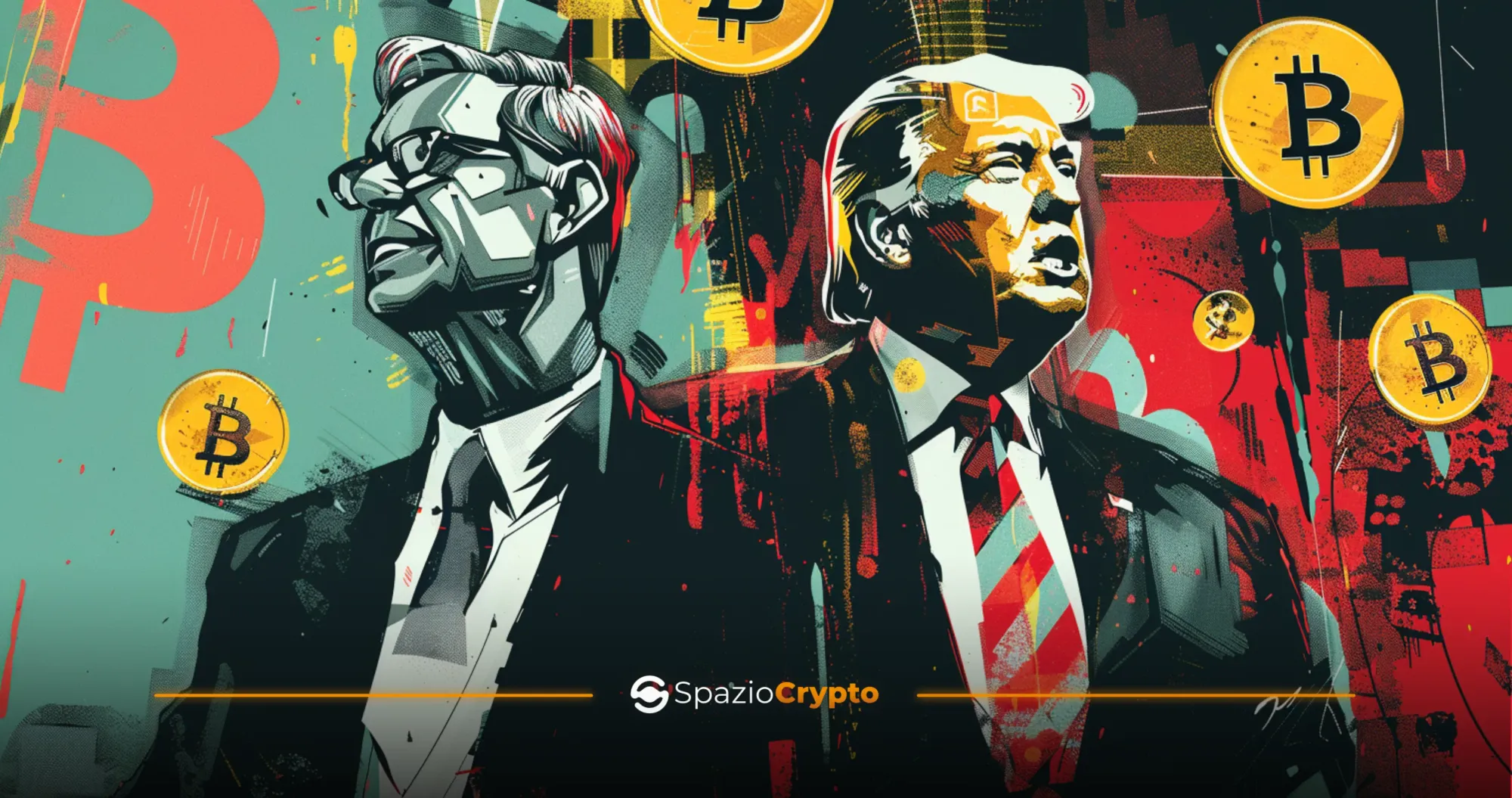In recent years, the term 'Metaverse' has started to appear more and more frequently in discourses and discussions. It has become an intriguing yet mysterious concept, often unclear to many, conjuring up images of virtual worlds and endless opportunities. But what exactly is the metaverse?
The Rise of the Metaverse
The metaverse is a concept that transcends traditional virtual reality. It is a futuristic vision of a persistent digital universe in which people can interact, work, play and experience in a manner similar to real life. In other words, it is a parallel digital world where virtual reality merges with physical reality.
The rise of the metaverse has been fuelled by multiple factors, including technological evolution, blockchain, increasing connectivity and a hunger for new digital experiences. The main technologies involved include virtual reality (VR), augmented reality (AR), artificial intelligence (AI) and blockchain, which together have helped create the foundation upon which the metaverse can grow.
With leading companies such as Meta (ex-Facebook), Google and Microsoft investing billions of dollars in metaverse-related projects, its importance in the technology landscape is hard to underestimate. The metaverse is already being developed, with platforms such as Decentraland, Roblox, Sandbox, and the more 'old school' Second Life offering glimpses of what the future may hold.
Importance of the Metaverse in the current context
The importance of the metaverse extends far beyond mere technological interest. It is crucial to understand how this new digital frontier is affecting society, the economy and our daily lives. The metaverse promises to radically transform sectors such as commerce, entertainment, education and remote working. But, like any new frontier, it also brings with it a number of risks and challenges that require in-depth consideration.
We will explore the associated opportunities and risks in detail. We will see how the metaverse is changing the digital landscape and how we can prepare for an increasingly interconnected future between the real and virtual worlds. Before delving further into this digital world, it is essential to understand the benefits and challenges that lie ahead.
Metaverse: New Commercial Frontiers
The metaverse is not only an evolution of virtual reality; it is also a unique opportunity for the commercial world. Companies of different sizes are exploring the potential of this digital environment to expand their reach and engage customers in ways never seen before. In the virtual worlds of the metaverse, virtual shops and showrooms can be created, offering immersive and personalised shopping experiences. Users can explore digital spaces, try on virtual products and interact with the brand in a completely new way. This promises to revolutionise the retail industry, enabling companies to reach a global audience and offer products and services in a highly customisable environment.
Entertainment in the Metaverse
Entertainment in the Metaverse is a field of continuous growth and innovation. Platforms such as Roblox have shown how attractive the Metaverse can be to young people and video game enthusiasts. However, entertainment is not limited to games. Virtual shows, concerts, and cultural events are being developed in the metaverse. These experiences offer unprecedented interactivity, allowing users to participate in and even influence events. Artists, musicians and creatives are exploiting these new opportunities to reach their audiences in innovative ways.
Metaverse and Remote Work
One of the most interesting areas is the use of the metaverse for remote work. The pandemic has accelerated the transition to working from home, and the metaverse offers new solutions to make this experience richer and more collaborative. Virtual meetings can become three-dimensional environments where participants can interact as if they were in the same room. This approach promises to improve communication and collaboration between team members, offering a more immersive remote working experience.
The Growth of the Virtual Economy and NFTs
The virtual economy is rapidly gaining ground in the metaverse, with a parallel growth of NFTs. NFTs are non-fungible tokens that represent unique digital assets and can be created and traded within virtual worlds. These tokens have paved the way for a new world of economic opportunities. Users can buy, trade or even earn NFTs, which can represent virtual objects, digital artwork, game pieces or more. This growth has the potential to open up new economic opportunities, but also raise issues related to digital ownership and regulation.
Risks Associated with the Metaverse
While the metaverse offers endless opportunities, it also presents a number of significant risks, with security and privacy at the top of the list.
Security and Privacy in the Metaverse
With the increasing integration of the physical and virtual worlds, cybersecurity threats are multiplying. Users can be exposed to scams, identity theft, computer intrusions and hacker attacks. In addition, users' personal information can be collected and exploited in ways that raise privacy concerns.
The need to develop robust security measures and ensure the protection of personal data becomes crucial. Regulation and best practices are still being developed, and security and privacy risks require careful and ongoing consideration.
Dependence on the Metaverse
Another risk is addiction to the digital world. Because it offers immersive experiences and endless possibilities for entertainment, there is a danger that some users become too involved in virtual worlds to the detriment of real life. Addiction to virtual games and environments is already a known problem, but the metaverse could amplify this trend, with consequences for people's mental health and quality of life.
It is important to educate users about the potential consequences of addiction to the metaverse and to promote responsible use. Content creators and platforms also have a role to play in providing tools to monitor and control usage.
Social and Ethical Impact of the Metaverse
The social and ethical impact is a complex issue. The metaverse offers the possibility of creating communities and social interactions in new and exciting ways, but at the same time it raises questions about the creation and management of these virtual communities. What happens if discrimination, bullying or other forms of harmful behaviour emerge in virtual worlds? How can we ensure fairness and diversity in a digital environment?
Ethics is an important challenge to address. There are questions about the use of algorithms to manipulate behaviour, fair access and the involvement of minorities. It is essential to proactively address these concerns and develop guidelines and policies to promote an ethical and inclusive metaverse.
Metaverse in Education: A Revolution in Learning
The metaverse is unveiling a revolutionary potential in education. Virtual classrooms, accessible from anywhere in the world without the need for physical travel, represent an epoch-making breakthrough. Teachers now have the ability to create interactive and immersive learning environments, redefining the way students acquire knowledge.
In these virtual classrooms, students can participate in live lectures or access pre-recorded content. The ability to interact with three-dimensional objects and simulations offers hands-on learning that goes far beyond traditional paper-based learning. Game and gamification elements make lessons more engaging, turning the learning process into a fun and motivating experience.
However, there are significant challenges accompanying this revolution. Accessibility remains a crucial issue, as not all learners have access to the technologies needed to participate. Ensuring equity in virtual education is a priority that requires the implementation of policies and solutions to reduce the digital divide between students.
The security of virtual learning platforms is another critical issue. Sensitive data, personal information and student interactions must be protected to avoid privacy breaches and possible cyber threats. Furthermore, control and monitoring tools need to be developed to ensure the safety of students during virtual classes.
Healthcare in the Metaverse: New Perspectives for Healthcare
Healthcare is pioneering new perspectives thanks to the metaverse, with an emphasis on telemedicine and virtual rehabilitation. Virtual medical simulation offers healthcare professionals a safe environment for training and practice. Medical students and doctors can simulate complex procedures and clinical situations, improving their skills in a risk-free environment for real patients.
Telemedicine is expanding significantly, allowing patients to receive medical care remotely via the metaverse. Virtual visits with physicians are becoming increasingly common, offering convenience and access to care, especially in remote areas or during emergency situations.
However, to ensure the effectiveness of these virtual therapies, it is crucial to ensure the security of patient data. The protection of sensitive health information must be a top priority. In addition, it is essential to develop guidelines and regulations to ensure that telemedicine meets ethical and medical standards.
Real estate sector and metaverse: A New Perspective for Visualisation
In the real estate industry, the metaverse is offering a new perspective on property visualisation. Buyers can virtually explore houses and flats, getting a realistic feel before making purchase decisions. This innovative approach reduces the need for physical visits, saving time and energy for both buyers and sellers.
Real estate companies are harnessing this technology to display properties in highly innovative ways. With detailed three-dimensional representations, buyers can visualise spaces with unprecedented accuracy.
To ensure security of customer data and transparency in the property display process, the real estate industry needs to develop clear standards and protocols. These standards should also address issues of accuracy and completeness of virtual property representations.
Emerging Technologies in the Metaverse: The Future-Evolving
The metaverse is constantly evolving, fuelled by emerging technologies that are redefining virtual experiences and opening doors to new possibilities. Prominent among these is 'mixed reality', which represents an innovative fusion of real-world and virtual elements. This convergence offers tremendous potential for applications in a wide range of fields, including product design, education and collaboration.
In product design, mixed reality allows engineers and designers to interact with virtual models in a three-dimensional environment. This process facilitates the prototyping and optimisation of products, reducing costs and development time. For example, an engineer can manipulate a virtual prototype of a vehicle, examining its operation and making changes in real time.
In the field of education, mixed reality offers fertile ground for high-fidelity simulations. Students can immerse themselves in realistic virtual environments to acquire practical skills. For example, future surgeons can practise complex procedures in a virtual environment before facing a real patient, reducing the margin of error and increasing patient safety.
Collaboration is another area where mixed reality can make significant changes. Companies and work teams can work together in shared virtual spaces, even if they are located in different parts of the world. This fosters real-time cooperation, allowing information and ideas to be shared more effectively.
At the same time, artificial intelligence (AI) is playing an increasingly important role in making the metaverse's virtual environments more dynamic and interactive. AI algorithms can personalise the user experience, offering content and interactions based on individual preferences and behaviour. This level of personalisation makes experiences in the metaverse more engaging and relevant to each user.
In summary, the metaverse is constantly changing thanks to emerging technologies, with mixed reality and artificial intelligence at the centre of this transformation. These technologies offer unprecedented opportunities to improve design, education, collaboration and user experience. However, it is important to address security and regulatory challenges to ensure that these innovations are exploited responsibly.
Regulating and Regulating the Metaverse: Balancing Innovation and Protection
As the metaverse expands, critical issues related to regulation and regulations emerge. Protecting consumers, ensuring data security and defining legal liability are key issues that require attention.
Government authorities are beginning to examine how to regulate this new digital space. It is a delicate balance to maintain: on the one hand, promoting innovation and development of the metaverse, on the other hand, protecting users from potential abuse and risks.
Consumer protection is a crucial aspect. Users of the metaverse need to feel safe, whether in matters of privacy, data security or virtual scams. Regulations must set clear standards for consumer protection and provide for dispute resolution mechanisms.
Data security is another key concern. In the metaverse, large amounts of personal and sensitive data are collected and shared. Regulations should define how this data can be used, stored and protected. Compliance with privacy laws and data encryption should be essential parts of regulations.
Legal liability is a complex issue, as virtual interactions can differ significantly from those in the real world. The regulations should define who is liable in case of disputes or damages caused by virtual actions. This requires a thorough understanding of the dynamics of the metaverse and a clear definition of the rules.
How to Prepare for the Metaverse: Practical Tips
As the Metaverse unfolds, it is essential that individuals, companies and institutions adequately prepare to take full advantage of this new digital reality.
Individuals: Individuals should invest in improving digital skills and cybersecurity knowledge. Understanding how to consciously navigate virtual environments is key to avoiding risks and maximising opportunities.
Companies: Companies should explore how the metaverse can enhance their operations. This could include creating virtual showrooms, training employees in virtual environments or using mixed reality for product design. In addition, it is important to protect sensitive data and adhere to industry regulations.
Institutions: Institutions should contribute to the development of appropriate regulations to ensure a safe and ethical metaverse. These regulations should reflect its complexity and balance innovation with the protection of users.
Conclusion: Balancing Risks and Opportunities in the Metaverse
In conclusion, the metaverse is a growing reality that offers significant opportunities in a variety of sectors. However, it is crucial to address the associated risks, including security, dependency and ethical challenges. As the digital world evolves, emerging technologies and regulation will become key factors in determining its success and sustainability. Preparing properly for the metaverse is essential to take full advantage of it and mitigate potential risks, and Spaziocrypto is at the forefront of educating users on this topic through our free Web3 guide. Collaboration between individuals, companies and institutions will be key to shaping a safe, ethical and prosperous digital ecosystem.








